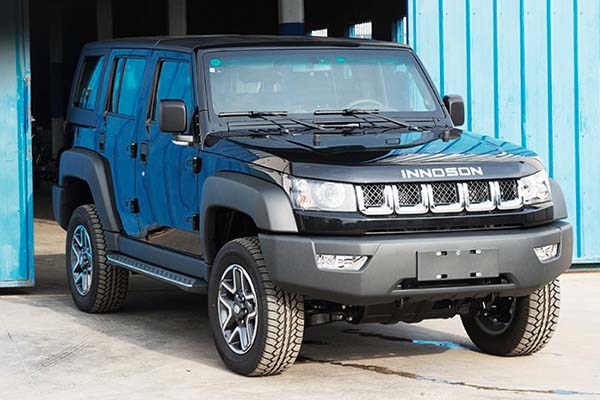Car/Vehicle Maintenance
7 ways to know a bad spark plugs

Spark plugs, though small in size, play a pivotal role in the proper functioning of a car’s engine.
When these components are compromised and become faulty, the consequences can be detrimental to the overall performance and efficiency of the vehicle.
Let’s delve into the various effects of bad spark plugs on a car.
1. Engine Misfires
One of the primary indicators of bad spark plugs is engine misfires.
When a spark plug fails to generate a proper spark or does so intermittently, it can lead to incomplete combustion of the air-fuel mixture.
This results in engine misfires, causing a noticeable reduction in power, rough idling, and overall poor performance.
2. Reduced Fuel Efficiency
Faulty spark plugs contribute to inefficient combustion, leading to decreased fuel efficiency.
When the air-fuel mixture is not ignited consistently or properly, fuel is wasted, and the engine has to work harder to maintain performance.
This increased workload results in higher fuel consumption, ultimately reducing the car’s miles per gallon (MPG).
3. Difficulty Starting the Engine
Bad spark plugs can make it challenging to start the engine, especially in cold conditions.
A weakened spark or the absence of a spark altogether hinders the ignition process.
This can manifest as prolonged cranking times, rough starts, or, in severe cases, an engine that fails to start altogether.
4. Poor Acceleration and Power Loss
As misfires occur due to bad spark plugs, the overall acceleration and power of the vehicle are adversely affected.
The engine struggles to generate the necessary power, resulting in sluggish acceleration and an overall reduction in driving performance.
5. Increased Emissions
Inefficient combustion caused by bad spark plugs can lead to higher emissions of unburned fuel and pollutants.
This not only contributes to environmental pollution but may also result in a failed emissions test, as the vehicle exceeds the allowable emission limits.
6. Potential Engine Damage
Prolonged neglect of bad spark plugs can lead to more severe consequences, including damage to other engine components.
Incomplete combustion may cause excessive carbon buildup on the spark plugs and within the combustion chamber, further impacting engine efficiency and potentially causing long-term damage.
7. Overheating Issues
Faulty spark plugs may contribute to engine overheating.
Inefficient combustion can lead to an imbalance in the engine’s heat dissipation, causing temperatures to rise.
Over time, this can lead to more significant issues, including damage to the engine’s internal components.
In summary, the effects of bad spark plugs on a car are far-reaching and impact various aspects of its performance.
Regular maintenance, including timely inspection and replacement of spark plugs, is crucial to ensure the proper functioning of the engine, maintain fuel efficiency, and prevent potential damage.
Ignoring the signs of bad spark plugs can lead to more extensive and costly repairs in the long run.
Car/Vehicle Maintenance
Top 10 Most Reliable Cars of the Decade

When it comes to cars, few things matter more than reliability. A sleek design or powerful engine can be exciting, but if your car constantly breaks down, eats into your wallet with repairs, or fails when you need it most, the excitement fades quickly.
Also Read: The Evolution of Car Safety: From Seatbelts to Self-Driving Tech
That’s why reliability remains one of the most important qualities for car buyers worldwide.
But what makes a car reliable? It’s more than just avoiding breakdowns. A truly reliable car has a combination of:
- Long lifespan (many reaching 200,000–300,000 miles).
- Affordable maintenance and repair costs.
- Consistent performance in real-world conditions.
- Strong track record across multiple generations.
In this article, we’ll look at the top 10 most reliable cars of the past decade, based on owner reviews, industry rankings, and global reputation. More than that, we’ll explore the stories behind their reliability, real-world examples of cars that prove why they deserve their legendary status.
Whether you’re a daily commuter, a family driver, or just a fan of dependable engineering, these cars show what it means to truly stand the test of time.
1. Toyota Corolla: The Global Workhorse
If reliability had a mascot, it would be the Toyota Corolla. Since its launch in 1966, the Corolla has sold more than 50 million units worldwide, making it the best-selling car in history. Its success isn’t built on flashy features, it’s built on trust.
Why It’s Reliable
- Simple, proven engine designs that prioritize durability.
- Affordable parts and easy maintenance.
- Consistently high safety and reliability ratings.
Real-World Story
Taxi fleets in countries like the Philippines, South Africa, and the Middle East rely heavily on the Corolla. Many of these vehicles run 400,000+ miles with only routine maintenance, an incredible testament to their engineering.
2. Honda Civic: A Legend Among Drivers
The Honda Civic has been a favorite among young drivers, tuners, and families alike for decades. Known for its versatility, the Civic balances fuel efficiency, sporty driving dynamics, and long-term dependability.
Why It’s Reliable
- Efficient, long-lasting engines.
- Compact design with strong engineering.
- High resale value thanks to its reputation.
Real-World Story
Many Civics from the 1990s and early 2000s are still on the road today, with owners reporting 300,000 miles or more. Enthusiasts also love them because parts are widely available and modifications are easy, making maintenance simple.
3. Toyota Camry: The Family Favorite
When families shop for a sedan that will last over a decade, the Toyota Camry is often their first choice. It’s been one of the best-selling cars in the U.S. for nearly 20 years, thanks to its blend of comfort, safety, and bulletproof reliability.
Why It’s Reliable
- Strong V6 and four-cylinder engines known for longevity.
- High safety ratings and low recall rates.
- Minimal repair needs compared to competitors.
Real-World Story
It’s not uncommon to find Camrys still running smoothly after 15+ years and 250,000 miles. Many family owners report only needing routine oil changes and brake jobs, proving that reliability doesn’t have to be expensive.
4. Lexus RX: Luxury That Lasts
The Lexus RX proves that luxury doesn’t have to mean high maintenance costs. Built on Toyota’s reliability foundation, the RX offers comfort, technology, and durability in one package.
Why It’s Reliable
- Toyota-engineered components with Lexus refinement.
- Excellent build quality.
- Known for smooth driving over hundreds of thousands of miles.
Real-World Story
Many Lexus RX owners report driving their SUVs well past 200,000 miles with very few major issues. Unlike some luxury competitors, the RX has one of the lowest long-term repair rates, making it a favorite for drivers who want luxury that lasts.
5. Honda Accord: Comfort Meets Dependability
The Honda Accord has consistently ranked as one of the most reliable midsize sedans for decades. It’s a favorite among professionals, families, and commuters who want a balance of comfort and durability.
Why It’s Reliable
- Proven engines with minimal issues.
- Spacious yet efficient design.
- Excellent resale value due to reliability.
Real-World Story
Ride-share drivers often choose the Accord because it can handle hundreds of daily miles without frequent repairs. That kind of punishment would break many cars, but the Accord thrives.
6. Toyota Prius: The Hybrid That Surprised Everyone
When the Toyota Prius first launched in the late 1990s, many people doubted hybrid technology. Would the batteries fail? Would it be too complex to maintain? Decades later, the Prius has proven those fears wrong.
Why It’s Reliable
- Hybrid system built on Toyota’s engineering.
- Exceptional fuel economy with minimal issues.
- Surprisingly strong resale value.
Real-World Story
Priuses used as fleet cars in places like California and New York often pass 200,000–300,000 miles with little more than battery checks and regular servicing. For a pioneering hybrid, that’s an extraordinary achievement.
7. Mazda MX-5 Miata: Fun Without the Fuss
Sports cars usually aren’t known for reliability, they’re high-performance machines that can be costly to maintain. But the Mazda MX-5 Miata breaks the mold, combining fun with dependability.
Why It’s Reliable
- Lightweight, simple design.
- Minimal electronic complexity compared to rivals.
- Strong enthusiast community with easy-to-find parts.
Real-World Story
Miata owners often report keeping their cars for decades, passing them down through generations. Despite being driven hard for fun, many Miatas exceed 200,000 miles without major breakdowns.
8. Subaru Outback: Built for Adventure
The Subaru Outback is the go-to car for drivers who live in rugged terrain or harsh weather. Its combination of all-wheel drive and strong engineering has made it a favorite for outdoor enthusiasts.
Why It’s Reliable
- Standard AWD with proven durability.
- Rugged build quality designed for all conditions.
- Spacious and practical for long trips.
Real-World Story
In snowy states like Colorado and Vermont, it’s common to see 10- to 15-year-old Outbacks still powering through winter roads. Some owners push theirs beyond 250,000 miles with regular maintenance.
9. Hyundai Elantra: Affordable and Dependable
In the past, Hyundai wasn’t known for reliability. But over the last decade, the Hyundai Elantra has transformed into one of the most dependable compact cars on the market.
Why It’s Reliable
- Major improvements in design and quality control.
- Strong warranty support.
- Affordable maintenance and parts.
Real-World Story
Drivers praise the Elantra for offering low-cost reliability. Many report hitting 200,000 miles without significant repairs, which is especially impressive for a budget-friendly vehicle.
10. Kia Sportage: The Rising Star
Like Hyundai, Kia has dramatically improved its reputation. The Kia Sportage, a compact SUV, has become one of the brand’s most reliable offerings in recent years.
Why It’s Reliable
- Backed by Kia’s industry-leading warranty.
- Redesigned with stronger materials and quality.
- Affordable compared to other SUVs.
Real-World Story
Many families choose the Sportage as their daily driver and keep them for 10+ years with minimal problems. The long warranty also gives peace of mind, further boosting its reputation.
Conclusion: What Makes a Car Truly Reliable?
Looking at this list, a few key themes stand out:
- Japanese brands dominate: Toyota and Honda continue to set the gold standard.
- Luxury doesn’t always mean unreliable: Lexus shows that premium cars can be dependable.
- Korean brands are rising: Hyundai and Kia have made major strides in quality.
- Maintenance matters: Even the most reliable car needs regular servicing to reach 300,000 miles.
At the end of the day, reliability is about peace of mind. Whether you’re commuting to work, taking your family on a road trip, or simply wanting a car that won’t let you down, these vehicles have proven themselves time and again.
Which of these cars have you owned? Share your story in the comments or on social media! Your experience could help others choose their next reliable ride.
Car/Vehicle Maintenance
Why Nigerians Should Buy Innoson Vehicles Instead of Importing Foreign Cars

Many Nigerians are willing to spend anywhere between ₦20 million to ₦50 million importing vehicles from overseas, vehicles that sometimes come squeezed into containers beside mattresses, whose true history remains unknown.
Also Read: Innoson IVM G6T: Redefining Luxury and Performance
 In Nigeria today, the dream of owning a car often comes with hefty price tags and endless import hassles.
In Nigeria today, the dream of owning a car often comes with hefty price tags and endless import hassles.
Was it an accident car? A flooded car? Or worse, a stolen car? Sadly, buyers often discover these truths long after they’ve already paid.
 But what if there was a better, smarter, and more patriotic option?
But what if there was a better, smarter, and more patriotic option?
That option already exists right here in Nigeria. Instead of spending millions importing a car, why not take a trip to Nnewi and drive home in a brand-new car from Innoson Vehicle Manufacturing (IVM)?
Innoson Vehicles: Nigeria’s Pride in Automobile Manufacturing
Founded by Chief Innocent Ifediaso Chukwuma, Innoson Vehicles (IVM) has grown from a bold dream into West Africa’s largest indigenous car manufacturer.
 From sedans and SUVs to pickup trucks, buses, and even electric vehicles, IVM has proven that Nigerians can produce rugged, durable, and modern vehicles that meet global standards.
From sedans and SUVs to pickup trucks, buses, and even electric vehicles, IVM has proven that Nigerians can produce rugged, durable, and modern vehicles that meet global standards.


IVM’s lineup is diverse and forward-thinking:
- IVM G5T Turbo – a sleek SUV with turbocharged performance.
- Ijele Pickup & Ikenga – powerful, rugged workhorses designed for Nigerian roads.
- IVM G60 Hybrid & EV Models – proving that Nigeria can keep pace with global trends in renewable energy and green mobility.
- IVM Caris Sedan – simple, stylish, fuel-efficient, and built with a powerful engine that doesn’t fail.
Dispelling the Myths About Pricing and Spare Parts
One of the biggest barriers to local adoption of IVM vehicles is misinformation. Many Nigerians have heard and believed online rumors about exorbitant pricing and scarce spare parts. But these claims rarely hold water when investigated.

 In reality, IVM cars are competitively priced, often cheaper than imported alternatives when you consider shipping, duties, and clearance fees. More importantly, the company has built a spare parts supply chain across major Nigerian cities, ensuring maintenance is accessible and affordable.
In reality, IVM cars are competitively priced, often cheaper than imported alternatives when you consider shipping, duties, and clearance fees. More importantly, the company has built a spare parts supply chain across major Nigerian cities, ensuring maintenance is accessible and affordable.
Why Buy Local?
Buying Innoson Vehicles is not just about owning a car; it’s about embracing value, durability, and national pride. Here are five key reasons Nigerians should consider IVM over imported cars:
- Durability for Nigerian Roads – Built with Nigeria’s road conditions in mind, IVM cars are rugged, adaptable, and reliable.
- Job Creation & Economic Growth – Patronizing IVM supports local industries, engineers, and workers.
- Faster Delivery – No months of waiting for shipping containers; buy today, drive tomorrow.
- Patriotic Support – Every purchase strengthens Nigeria’s economy and showcases African innovation.
- Diverse Options – Whether you want a truck, SUV, EV, or sedan, IVM offers something for everyone.
Time to Drive Something Different
Why always stick to Toyota, Honda, Mercedes, or BMWs? While these brands dominate Nigerian roads, it’s time to diversify. Imagine the pride of pulling up in an IVM Caris or powering through rugged terrain in an IVM Ijele Pickup.
 Nigerians deserve to experience cars that reflect their own culture, environment, and innovation. And Innoson is making that possible.
Nigerians deserve to experience cars that reflect their own culture, environment, and innovation. And Innoson is making that possible.
Final Word
Cornelius Chibueze once said it best:
“Sometimes drive something different, let’s patronize made-in-Nigeria vehicles. They are strong, rugged, durable, and reliable.”
Instead of chasing foreign used cars with uncertain histories, Nigerians now have the chance to support a homegrown brand that delivers quality and reliability. The future of Nigeria’s automobile industry is here and it’s proudly Innoson.
Car/Vehicle Maintenance
5 Reasons Why Your Steering Wheel Might Vibrate at Highway Speeds

You’re cruising comfortably on the Lagos-Ibadan Expressway, music on, speed steady at 100km/h then suddenly, your steering wheel begins to vibrate.
Also Read: Why Do Drivers Sleep on Steering While Driving?
 At first, it feels like a mild shake, but as you accelerate, the vibration worsens, making the entire driving experience uncomfortable, even frightening.
At first, it feels like a mild shake, but as you accelerate, the vibration worsens, making the entire driving experience uncomfortable, even frightening.
This isn’t just a nuisance. A vibrating steering wheel can signal serious underlying problems with your car problems that could put your safety at risk if ignored. According to the Federal Road Safety Corps (FRSC), poor vehicle maintenance and mechanical faults account for nearly 10% of road crashes in Nigeria. Steering vibrations often fall into this category.
At RoadKing.ng, we believe every motorist should understand what causes these vibrations and how to fix them. Below, we break down the five most common reasons your steering wheel shakes at highway speeds and what you can do about them.
1. Unbalanced Wheels
One of the most common culprits behind steering wheel vibrations is improper wheel balancing.
- How it happens: When tires are installed or rotated without proper balancing, uneven weight distribution occurs. At higher speeds, the imbalance causes the steering wheel to shake.
- Warning signs: Vibration increases as you accelerate past 80km/h; uneven tire wear; humming or buzzing noise.
- Solution: Visit a tire service center for professional wheel balancing. A computer-assisted balancing machine ensures all four wheels carry equal weight distribution.
Pro Tip (RoadKing Standard): Always balance your wheels after tire replacement, rotation, or rim repairs.
2. Wheel Alignment Issues
Poor wheel alignment is another leading cause of vibrations.
- How it happens: Driving regularly on pothole-ridden Nigerian roads can knock your wheels out of alignment. When this happens, the steering struggles to stay centered, causing vibrations and uneven pulling.
- Warning signs: Car pulls to one side; crooked steering wheel when driving straight; rapid tire wear.
- Solution: Get a proper wheel alignment check. Many modern alignment machines use lasers for accuracy.
Pro Tip: Check alignment every 6 months or after hitting a major pothole/curb.
3. Worn Brake Rotors
If your steering wheel vibrates mainly when you brake, the problem likely comes from your brake system.
- How it happens: Over time, brake rotors can become warped due to heat, friction, or poor-quality parts. When the brake pads press against warped rotors, they cause pulsations that transfer to the steering wheel.
- Warning signs: Steering shakes only while braking; squealing or grinding noise; longer stopping distance.
- Solution: Replace or resurface the affected rotors. Always pair new rotors with quality brake pads.
Pro Tip: Avoid sudden hard braking unless necessary, it reduces heat stress on your rotors.
4. Suspension and Steering Problems
Your vehicle’s suspension system is designed to keep your wheels stable and your ride smooth. When parts wear out, they can trigger vibrations.
- How it happens: Worn tie rods, ball joints, or bushings create play in the steering system, leading to shaking at higher speeds.
- Warning signs: Excessive vibration on rough roads; clunking noises when turning; uneven steering response.
- Solution: Have a professional mechanic inspect your suspension. Replace worn components immediately to restore stability.
Pro Tip: Don’t ignore minor vibrations, they often signal suspension wear long before a major breakdown.
5. Tire Problems (Uneven Wear or Defects)
Your tires are the only part of your car that touch the road, so when something’s wrong with them, it shows up quickly in your steering.
- How it happens: Uneven tire wear, bulges, flat spots, or low-quality tires often cause steering vibrations. Nigerian roads, with their frequent potholes, speed bumps, and rough patches, make this even more common.
- Warning signs: Visible cracks, uneven tread depth, or bulging sidewalls; vibrations worsen at higher speeds.
- Solution: Rotate tires every 5,000km; replace worn or damaged tires immediately.
Pro Tip: Invest in quality tires, they last longer, perform better, and reduce steering problems.
Bonus Causes (Less Common But Serious)
- Engine or Transmission Mounts: Worn mounts transfer vibration into the steering wheel.
- Axle or Driveshaft Damage: Usually from accidents or hitting large potholes.
- Wheel Bearings: When they wear out, they create rumbling noises and vibration.
Why You Shouldn’t Ignore Steering Wheel Vibrations
A shaky steering wheel isn’t just uncomfortable, it’s dangerous. Left unchecked, it can lead to:
- Loss of control at highway speeds.
- Increased stopping distance due to faulty brakes.
- Premature wear on tires, rotors, and suspension parts.
- Costlier repairs down the line.
According to WHO’s 2022 Global Road Safety Report, mechanical issues like worn tires and brakes contribute significantly to Africa’s high road crash fatality rates. Addressing vibrations early can save lives.
RoadKing.ng Safety Checklist for Drivers
Before your next highway trip, do this quick check:
- Inspect tire pressure and tread depth.
- Ensure wheels are balanced and aligned.
- Check for brake noises or pulsations.
- Listen for clunking sounds in suspension.
- Book regular servicing, prevention is cheaper than repairs.
Conclusion
Your car is always communicating with you. A vibrating steering wheel is its way of saying something’s wrong. Whether it’s unbalanced wheels, alignment issues, worn rotors, suspension problems, or bad tires, don’t ignore it.
At RoadKing.ng, our advice is simple: fix the problem early, drive safely, and protect lives on Nigerian roads.

 Crash News1 day ago
Crash News1 day agoTwo Killed in Fiery I-35 Pileup in Cotulla, Texas

 News Update2 days ago
News Update2 days agoChaos in New York: Trump’s Motorcade Blocks Macron Amid UN Tensions

 Driving School Review1 day ago
Driving School Review1 day agoProtecting Your Driving School Name: Essential Guidance

 Articles1 day ago
Articles1 day agoInside Nigeria’s Most Dangerous Highways: The Roads That Claim the Most Lives

 Automotive Spotlight & Review6 hours ago
Automotive Spotlight & Review6 hours agoThe New Mercedes-Maybach V12 Edition: Only 50 Units of Ultra-Exclusive Luxury

 News Update1 day ago
News Update1 day agoBangkok Hospital Sinkhole Disaster: No Casualties, But Urban Fragility Exposed

 Crash News23 hours ago
Crash News23 hours agoCar Explosion at Rivers State University: Students Panic as Vehicle Blows Up Near Main Gate

 Crash News1 day ago
Crash News1 day agoContainer Crushes Police Officer, Passenger to Death on Ijora Causeway, Lagos




























